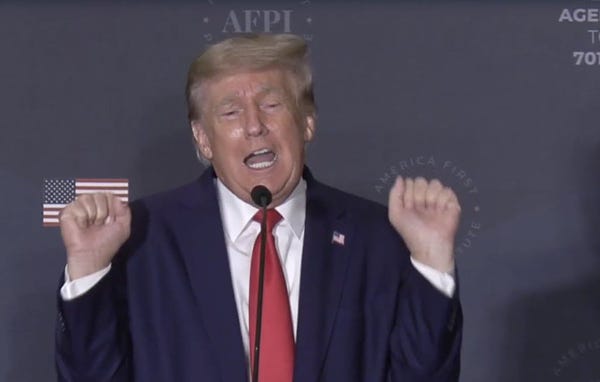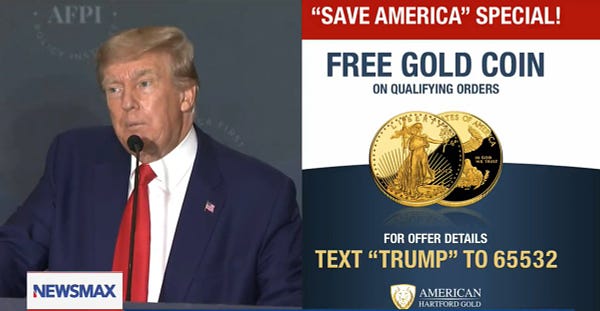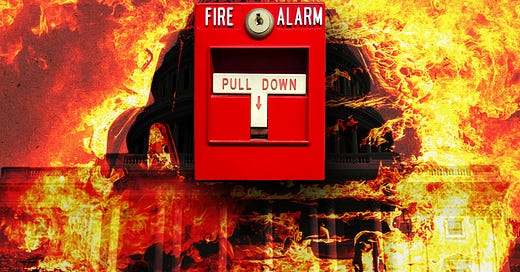“We intend to hold everyone, anyone who was criminally responsible for the events surrounding Jan. 6, for any attempt to interfere with the lawful transfer of power from one administration to another, accountable. That’s what we do. We don’t pay any attention to other issues with respect to that.” — Attorney General Merrick Garland to NBC’s Lester Holt, July 26, 2022
Happy Wednesday.
The big news overnight: “Justice Dept. investigating Trump’s actions in Jan. 6 criminal probe.”
This sounds promising, but as former DOJ prosecutor Andrew Weissmann warns, the clock is running. Weissmann was a lead prosecutor on Special Counsel Robert Mueller’s investigation of Russia interference in the 2016 election, and the author of “Where Law Ends: Inside the Mueller Investigation.” He now teaches at NYU Law School is a legal analyst for NBC and MSNBC.
On Tuesday’s podcast, we talked about the possibility of criminal charges against the ex-president — and what would happen if Merrick Garland ultimately decided to let him off the hook.
You can listen to our whole conversation here.
Charlie: If they don't go forward with charges, if they decide that it's just too heavy a lift, and Trump is returned to the presidency, what would Trump 2.0 look like, do you think?
Weissmann: I don't know that I have enough alcohol at home to even fathom that.
The abuse of the pardon power, I think would, which we already saw, I think would create a completely lawless society. He could essentially engage in crime and have other people engage in crime, and then pardon them.
I think he has learned to make sure he's surrounded by lackeys. The article recently in Axios about essentially getting rid of civil service, which is to put in only political appointees, and various agencies, I think would be incredibly harmful, so that you don't have a sense of people being loyal to the law and the Constitution as opposed to a person. It would be truly frightening.
Charlie: I don't think that's an exaggeration, by the way. What would his Department of Justice look like? I guess the question would be, we've gotten this picture of members of the Department of Justice, who are Trump appointees in Trump 1.0, standing up against him before January 6th, but in Trump 2.0, who would be there? Who would be in the Department of Justice? Who would take those jobs? And what would happen to the career employees?
Weissmann: Well, I think one way to think about that is that Attorney General Sessions was essentially booted out, because he understood that the role of the Attorney General and the Department of Justice was to be independent of the White House.
And, for instance, when the President said that we really need to go after more Democrats and essentially fewer Republicans, he knew that that was wrong. But he was replaced by Barr, and Barr did the President's bidding in all sorts of ways, including with Michael Flynn, taking a position that was just completely, in my view, improper and unethical, providing human benefit that was not being provided to anyone else, and taking a position on the law that the department was simultaneously saying was not the law, in other cases. They sought a lower sentence for Roger Stone, when they never would have done that for anyone else.
So, Barr really took the department down the road of just being a lackey. But as we've seen, even he had his limits, and he was unwilling to engage in the overthrow of a democratic election. So, there was some limit on what he would do.
I'm afraid that if you follow that pattern that in Trump 2.0, essentially, the Attorney General will be people like Jeffrey Clark, or Sidney Powell or Michael Flynn, where even that limit that Bill Barr had and Jeffrey Rosen had would not be in place.
Charlie: Well, I think that's one of the lessons that Trump would probably think that he had learned. That he has to have the loyalists. That he can't have anyone who has any sense of independence in those positions. And, of course, in 2.0, he would never face the voters again, he would know he would never really have to face legal consequences, because he could use the pardon power. I'm just interested in the kinds of lawyers who would staff… the Department of Justice and the willingness of Republican Senate to confirm those nominees….
Weissmann: So, I agree with you. And we're really just talking about the Department of Justice and while obviously, that's very dear to my heart, and it strikes at a fundamental tenet of our democracy, I mean, it, unfortunately, is not hyperbole to say that, if he is reelected, I think it'll be hard to know why we're not now an authoritarian government and ... we'll really see the end of a sort of American experiment and democracy.
Trump’s Dystopia
Because he deviated somewhat from his usual glossolalia of grievance, some jaded commentators described Trump’s remarks Tuesday as a “policy address.”
It wasn’t.
As Chris Cillizza noted last night: “There is no such thing as a Donald Trump policy speech.”
He said the country was "on the brink" and the weakest that it has been since the Civil War. (Trump cited Newt Gingrich as the authority on that second claim.) He said we have "very little" public safety. He said that there is an "invasion" of immigrants coming into the country. He said, "Our streets are riddled with needles and soaked with the blood of innocent victims." He decried "drugged-out lunatics" and "sadists" who he insisted are taking over the country. "Our country is now a cesspool of crime," said Trump.
His policy solution? "It has to stop and it has to stop now."
For the most part, Trump played his oldies: summary executions of drug dealers, massive tent cities for the homeless, fines for countries whose citizens come here illegally.
“Open up large parcels of inexpensive land in the outer reaches of the cities,” Trump said, describing how he would implement the plan to remove people living in tents.
The pro-life president waxed especially enthusiastic over the prospect of killing drug dealers.
“The penalties should be very, very severe,” he said. “If you look at countries throughout the world, the ones that don’t have a drug problem are ones that institute a very quick trial death penalty sentence for drug dealers,” Trump told attendees at the invite-only event.
“It sounds horrible, doesn’t it? But, you know what? That’s the ones that don’t have any problem,” he said. “It doesn’t take 15 years in court. It goes quickly, and you absolutely, you execute a drug dealer, and you’ll save 500 lives.”
Trump has repeatedly praised the drug punishment policies of countries like the Philippines, where former President Rodrigo Duterte is estimated to have murdered more than 6,000 drug dealers in one year, according to the State Department’s 2016 Human Rights Report.
There was other stuff as well, from the leader of the party of States’ Rights:

And, of course, there was the usual cosplay:


And really, what says American Greatness more than massive internment camps, executions, border walls, federal troops in the streets, coups, and the mockery of sexual minorities?
Amirite?
**
Previously undisclosed emails provide an inside look at the increasingly desperate and often slapdash efforts by advisers to President Donald J. Trump to reverse his election defeat in the weeks before the Jan. 6 attack, including acknowledgments that a key element of their plan was of dubious legality and lived up to its billing as “fake.”
The dozens of emails among people connected to the Trump campaign, outside advisers and close associates of Mr. Trump show a particular focus on assembling lists of people who would claim — with no basis — to be Electoral College electors on his behalf in battleground states that he had lost.
BONUS:

Quick Hits
1. Trump’s Jan. 6th National Guard Lie Crumbles
Amanda Carpenter writes in today’s Bulwark that Christopher Miller, Trump’s acting defense secretary, gave a very different story under oath than he did to Sean Hannity.
In February 2021, [Mark] Meadows told Fox News host Maria Bartiromo, “As many as 10,000 National Guard troops were told to be on the ready by the secretary of defense. That was a direct order from President Trump.”
That lie has now been decisively put to rest.
Yesterday, the House January 6th Committee revealed testimony from Christopher Miller, Trump’s acting secretary of defense, rejecting the notion that Trump ordered thousands of Guard troops to be standing by:
To remove any doubt: Not only did Donald Trump fail to contact his Secretary of Defense on January 6th (as shown in our hearing), Trump also failed to give any order prior to January 6 to deploy the military to protect the Capitol. Here is Secretary Miller’s testimony—In the audio clip, a questioner asks Miller whether there is “any accuracy” to Meadows’s statement. Miller’s reply:
Not from my perspective. I was never given any direction or order or knew of any plans of that nature. So, I was surprised by seeing that publicly . . . we obviously had plans for activating more folks, but that was not anything more than contingency planning. There was no official message traffic or anything of that nature.
The questioner follows up: “Just so we’re clear, you did not have 10,000 troops, quote ‘to be on the ready’ . . . prior to January 6th?”
Miller: “A non-military person probably could have some sort of weird interpretation, but no, to answer your question, that was not part of my plan or the Department of Defense’s plan.”
Questioner: “To be crystal clear, there was no direct order from President Trump to put 10,000 troops ‘to be on the ready’ for January 6th, correct?”
Miller: “That’s correct. There was no direct—there was no order from the president.”
2. The Secret Service’s Inexcusable Document Destruction
It’s a big deal, writes Philip Rotner, and merits a Justice Department investigation.
Even if taken at face value, the service’s explanation for this slaughter is more of a confession than a justification: Gross negligence, recklessness, and finger-pointing are the service’s defense. Because the alternative—that the destruction of communications may have been part of an intentional coverup—is unthinkable.
But even if the Secret Service was “merely” reckless, as it has effectively admitted, those responsible must be held accountable.
3. Tucker Carlson’s Dogged Pursuit
Bill Lueders writes that the Fox News host is right to bring attention to the plight of beagles used in animal testing—even if he’s doing it for the wrong reasons.
The primetime cable bloviator demonstrated a shallow understanding of his subject, engaged in unnecessary hyperbole, and was clearly motivated by bad intentions—to further demonize one of the right’s biggest bogeymen, Dr. Anthony Fauci of the National Institutes of Health.
But Carlson and his guest, Daphna Nachminovitch, a senior vice president of People for the Ethical Treatment of Animals (PETA), were on firm ground in decrying a dog-breeding and research facility in Virginia that is being forced to relinquish all of its 4,000 beagles because of scores of violations of the federal Animal Welfare Act.
Cheap Shots


**
Orbán update:










The people who say that prosecuting Trump becomes a political consideration conveniently ignore the fact that choosing not to prosecute him if the evidence warrants it also would be a political consideration. You can't have it both ways. The DOJ should simply do what is right by the letter of the law and let the facts guide the process. That is the only justifiable outcome if truly nobody is above the law.
The statement that "really we're just talking about the DOJ" is the most sickening and terrifying statement in your interview because of course we're NOT just talking about the DOJ. We are talking about the entire Federal judiciary. And worse, all the law enforcement agencies -- Homeland security, the FBI, the CIA, NSA... And it gets even worse, we're talking about the entire gigantic US Military-- all branches. No person in the US military will have a career unless he or she is a vetted loyalist. And we are talking about every contractor and company in America that does business with first the Federal government and little by little with every captured state government. Ultimately we are talking about every public employee in the country-- every janitor, schoolteacher, secretary, city engineer, county clerk.
We are talking about the Trump DOJ and IRS initiating a campaign of persecuting enemies and disloyalists. No person who has ever filed a tax return will be safe.
And we are talking about shutting down the press through the court system. Of all the promises Trump ever made, this one is assuredly most dear to his heart:
"One of the things I'm going to do if I win, ... I'm going to open up our libel laws so when they write purposely negative and horrible and false articles, we can sue them."
And he goes on, even more clearly:
"You see, with me, they're not protected, because I'm not like other people but I'm not taking money. I'm not taking their money," Trump said on Friday. "We're going to open up libel laws, and we're going to have people sue you like you've never got sued before."
"We're going to have people sue you like you've never got sued before." A wrinkle I did not see coming was the innovation in Texas, of circumventing the constitution by legislating that any person can sue anyone else to recover "damages" where hitherto complainants would have had no standing, the defendants can be sued in multiple locations and must defend themselves in each, must prevail in order to not pay, and can't recover damages for being sued frivolously. And the current Supreme Court through its silence on this has given it tacit approval. All they have to do to uphold this wherever it occurs is not accept any case that comes to them.
This I think will be one of the avenues for shutting down the press and it will allow the Supreme Court to ignore the first amendment, because it won't be Congress making a law to restrict the freedom of the press.
I think you should expect at least a 1/3 chance, maybe more than 50/50, that during the first term, if the Republicans seize the Senate, the filibuster will disappear (it's a mirage now anyway) and this last thing will be on the agenda. There is a certainty they will start on the civil service and an absolute certainty that no DOJ appointee will not be an apparatchik. And the military will fall like a row of dominos even without any official change in law because the top brass will disappear -- look for a huge wave of retirements in the first year -- and everyone else down the chain will get the message.
And don't think any other Republican won't do exactly the same thing. They have started their revolution, they are all at war. They can't turn back.
It is appropriate to contemplate this historical fact. The unimaginable and unthinkable can happen very, very fast. Hitler became Chancellor of Germany in January of 1933. The oath of allegiance sworn by members of the military prior to his accession was loyalty to the Constitution and its lawful institutions.
When Hitler became Chancellor it was changed: loyalty to people and country ("Volk und Vaterland.")
Hindenberg died August 3, 1933. On that day the oath changed again, this time loyalty to Adolf Hitler himself. This mutation lasted one year. On August 20 1934 this was superseded by the Law On the Allegiance of Civil Servants and Soldiers of the Armed Forces, which decreed loyalty not only of armed forces but all civil servants.
Article One:
Civilian officials and soldiers of the Armed Forces must take an oath of service on entering the service.
Article Two:
1. The oath of service of civilian officials will be:
“I swear: I shall be loyal and obedient to Adolf Hitler, the Führer of the German Reich and people; respect the laws; and fulfil my official duties conscientiously, so help me God.”
2 The oath of service of the soldiers of the Armed Forces will be:
“I swear by God this sacred oath, that I will render unconditional obedience to Adolf Hitler, the Fuhrer of the German Reich and people, supreme commander of the Armed Forces, and will be ready as a brave soldier to risk my life at any time for this oath.”
(translation is from https://alphahistory.com/nazigermany/a-new-reichswehr-oath-1934/)